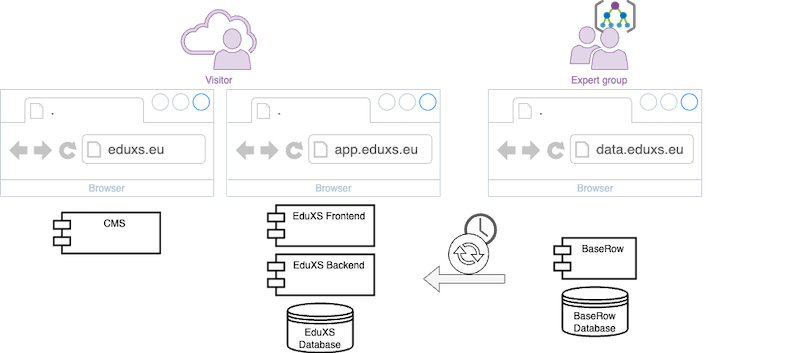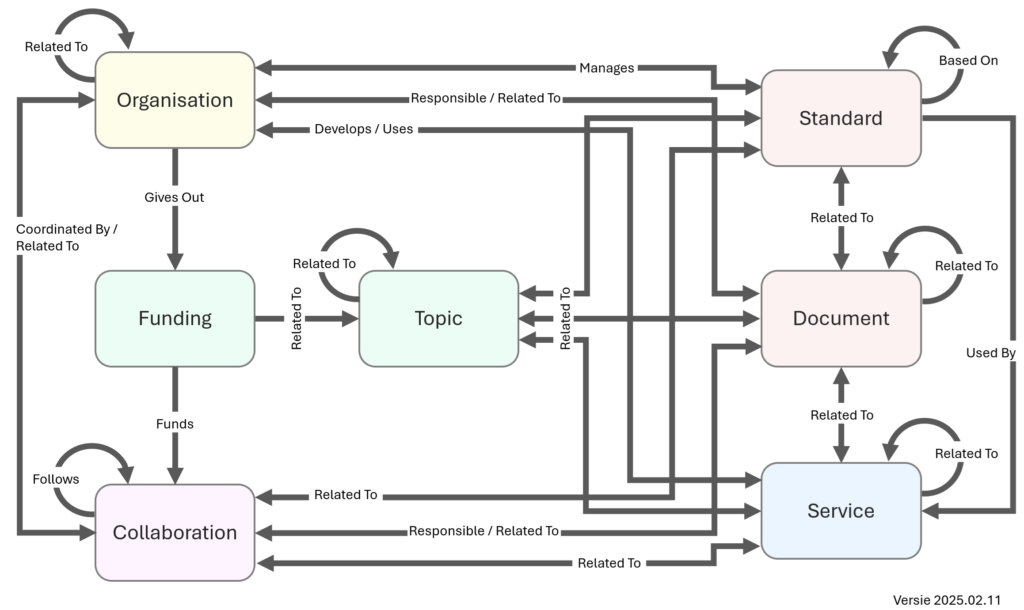References
Here you can find detailed information about the development of EduXS, More information will follow so stay tuned.
Functional overview
The EduXS landscape consists of two main parts:
- The website eduxs.eu
- The application app.eduxs.eu

A visitor to EduXS can learn about the project by exploring the eduxs.eu website. From there, they can access the EduXS application via a direct web link. The application itself is a website that allows users to navigate through the EduXS data.
Developed and maintained by the EduXS development team, the application consists of two main components: the frontend and the backend. The frontend provides the visitor portal, accessible through a web browser, while the backend serves as the technical infrastructure that powers data interaction and supports frontend functionality.
The Expert Group provides and curates the EduXS data and manages the relationships between data points. They work within a system called Baserow, which allows data input and output on its own data structures, through its own expert interfaces. All data is in the Baserow database.
To connect Baserow and the application, the EduXS team developed a mechanism that regularly synchronizes data between Baserow and the application, ensuring up-to-date information.
Swagger
We use Swagger for the documentation of our API to streamline the design, collaboration, and testing processes. Swagger allows us to automatically generate API documentation and utilise a standardised format based on the OpenAPI specification, making it easy for both developers and users to understand the functionality of the EduXS API. Additionally, the interactive Swagger UI enables us to test the API directly, improving development efficiency, collaboration, and ensuring the quality of our API.
> to Swagger
Information Model 2025
The schema provides a high-level view of EduXS’s information structure, illustrating interconnections between elements. Its key strength lies in visualising relationships among entities in educational innovation, helping stakeholders understand dependencies and identify synergies. This holistic view enables informed decision-making and avoids redundancy.
As an index, EduXS guides users to relevant resources, standards, tools, and the organisations behind them. This fosters collaboration and supports stakeholders in building on each other’s work to advance educational innovation.

The five primary entities in the model
- Standards: Guidelines and protocols—formal, informal, or in development—that support or relate to digital educational practices. Standards define system interoperability, facilitate seamless data exchange, and ensure alignment across various platforms.
- Documentation: Information such as best practices, architectural guidelines, and insights from previous projects and initiatives. Documentation captures valuable knowledge, preserving successful practices to ensure they are accessible to others.
- Services: Digital tools and services within the educational ecosystem. From online learning platforms to administrative systems, these services contribute to a cohesive and well-integrated educational environment.
- Organisations: Registered entities in EduXS that play a key role in developing and maintaining standards, services, and documentation, or that fund and enable the advancement, implementation, and promotion of these resources.
- Collaborations: Temporary groups, including projects, work groups, or technical committees from one or more organisations, are registered as Collaborations in EduXS. These groups facilitate the sharing of knowledge and expertise, driving ongoing improvement within the digital education landscape.
Update February 2025
The 2025 version of the Information Model has been updated. The main change is that Topic can now reference itself.
